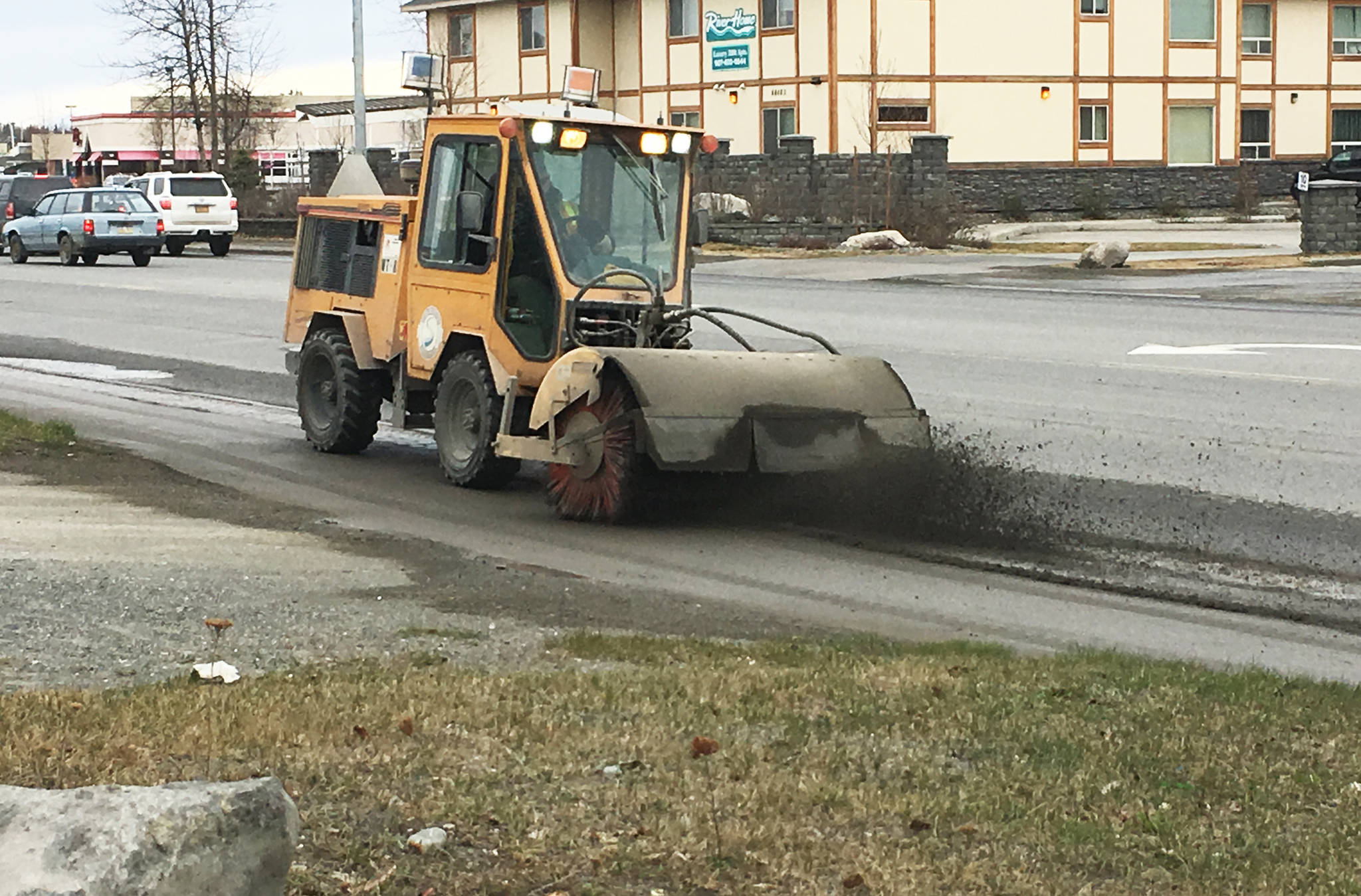With the snow gone and sand lining the peninsula’s streets and parking lots, new regulations in Soldotna seek to reduce how much of that sand ends up in the city’s air.
An ordinance regulating sand sweeping practices was adopted in June 2016, a time when most street and lot sweeping is already complete, so this spring is the first season where contractors will see a difference in rules that could affect their work. The ordinance essentially sets standards for sand and gravel clearing that seek to cut down on the amount of dust that gets sent into the air through the sweeping process.
Street sweepers must use machines that are equipped with a bag or filtration device to catch “particulate matter” that would otherwise become airborne, according to the ordinance text. If a company’s mechanical sweeping device doesn’t have some kind of filtration system, they can only be used if the area they are clearing has been wetted down first, according to the ordinance.
“Dust palliatives,” or a substance applied to a surface that helps reduce dust rising into the air, are another option for contractors besides water.
City Planner John Czarnezki said the ordinance regulating dust was brought forward in response to complaints the city has been getting over the years. In a May 2016 memo attached to the ordinance, Director of Economic Development and Planning Stephanie Queen wrote that clouds of dust hanging around in Soldotna had even prompted one person to call 911, “believing that a local business was on fire.”
Czarnezki said he has talked with several area contractors who do lot clearing and that the response has been good.
“We’re just trying to address the many requests we’ve received in the past,” he said.
None of the new rules regarding dust control apply to family homes.
“Single-family dwellings are exempt, so the folks that want to use a leaf blower or a broom or whatever method they want … that’s still allowed in the city,” Czarnezki said.
Those clearing around commercial dwellings and in parking lots must adhere to the new dust-reducing standards or face a $100 fine. Czarnezki said city staff or members of the Soldotna Police Department will first give warnings and inform people who aren’t aware of the rules, using the fine as a last resort.
Members of Soldotna’s Maintenance Department have been practicing wet sweeping for years, and are therefore already in compliance with the new ordinance, said Maintenance Department Manager Scott Sundberg. His staff uses two machines called vacuum sweepers that have water on board, which allow them to pre-wet the city streets as they sweep. Dust that gets kicked up in the process goes through a filtration system and is caught in a “hopper,” Sundberg said.
“It takes a little more work to do it wet,” he said, noting that sand and other matter is easier to sweep if it’s dry.
The city uses different machines to pick up the bulk of sand left behind from winter, Sundberg said, which is swept into gutters before being picked up. The vacuum sweepers follow behind to pick up the finer materials left over.
One contractor brought an unforeseen issue with the dust-reducing rules to the Soldotna City Council at its Wednesday meeting. Mark Rozak, of Steam on Wheels LLC, said a part of the ordinance that prohibits the use of blowers to remove dust and sand was hampering his company’s ability to clear sidewalks and areas of lots close to the sides of buildings.
Rozak told the council he is all for reducing the amount of dust blown into the city’s air, but that his workers generally use blowers to get sand and gravel away from sidewalks and the sides of buildings before they use larger machines to sweep it up. The alternative is to use manual brooms, which greatly slows the company’s work, Rozak told the council.
In response to Rozak’s testimony, City Manager Mark Dixson drafted and sent an exception to him and the Soldotna Police Department to ensure that kind of work can continue. Dixson said, to his knowledge, the company is back to business as usual.
According to the exception, the portion of Soldotna’s city code regulating dust control “does not apply to using a leaf blower or similar equipment to ‘skirt’ around buildings or sidewalks to move the particulate which is within 4 feet of buildings or sidewalks into a paved area where the particulate will be swept.”
“I’m authorized to enforce the ordinances for the city of Soldotna, and in looking at that and in talking to the Planning (and Zoning) Department, this wasn’t considered,” Dixson said of the skirting technique.
Dixson said the city will look into the issue further, but that using a blower to move sand and gravel away from buildings to be swept up is not being considered a health hazard.
Reach Megan Pacer at megan.pacer@peninsulaclarion.com.

